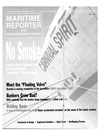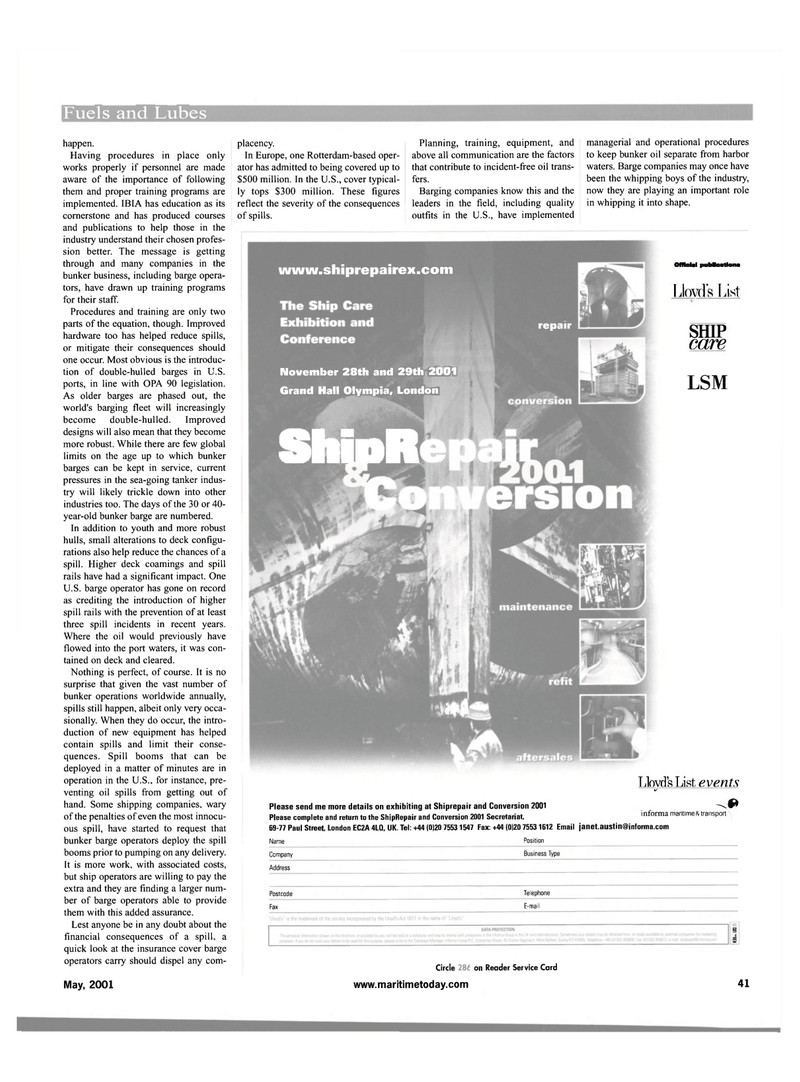
Page 41: of Maritime Reporter Magazine (May 2001)
Read this page in Pdf, Flash or Html5 edition of May 2001 Maritime Reporter Magazine
Fuels and Lubes happen.
Having procedures in place only works properly if personnel are made aware of the importance of following them and proper training programs are implemented. IBIA has education as its cornerstone and has produced courses and publications to help those in the industry understand their chosen profes- sion better. The message is getting through and many companies in the bunker business, including barge opera- tors, have drawn up training programs for their staff.
Procedures and training are only two parts of the equation, though. Improved hardware too has helped reduce spills, or mitigate their consequences should one occur. Most obvious is the introduc- tion of double-hulled barges in U.S. ports, in line with OPA 90 legislation.
As older barges are phased out, the world's barging fleet will increasingly become double-hulled. Improved designs will also mean that they become more robust. While there are few global limits on the age up to which bunker barges can be kept in service, current pressures in the sea-going tanker indus- try will likely trickle down into other industries too. The days of the 30 or 40- year-old bunker barge are numbered.
In addition to youth and more robust hulls, small alterations to deck configu- rations also help reduce the chances of a spill. Higher deck coamings and spill rails have had a significant impact. One
U.S. barge operator has gone on record as crediting the introduction of higher spill rails with the prevention of at least three spill incidents in recent years.
Where the oil would previously have flowed into the port waters, it was con- tained on deck and cleared.
Nothing is perfect, of course. It is no surprise that given the vast number of bunker operations worldwide annually, spills still happen, albeit only very occa- sionally. When they do occur, the intro- duction of new equipment has helped contain spills and limit their conse- quences. Spill booms that can be deployed in a matter of minutes are in operation in the U.S., for instance, pre- venting oil spills from getting out of hand. Some shipping companies, wary of the penalties of even the most innocu- ous spill, have started to request that bunker barge operators deploy the spill booms prior to pumping on any delivery.
It is more work, with associated costs, but ship operators are willing to pay the extra and they are finding a larger num- ber of barge operators able to provide them with this added assurance.
Lest anyone be in any doubt about the financial consequences of a spill, a quick look at the insurance cover barge operators carry should dispel any corn-
May, 2001 placency.
In Europe, one Rotterdam-based oper- ator has admitted to being covered up to $500 million. In the U.S., cover typical- ly tops $300 million. These figures reflect the severity of the consequences of spills.
Planning, training, equipment, and above all communication are the factors that contribute to incident-free oil trans- fers.
Barging companies know this and the leaders in the field, including quality outfits in the U.S., have implemented managerial and operational procedures to keep bunker oil separate from harbor waters. Barge companies may once have been the whipping boys of the industry, now they are playing an important role in whipping it into shape.
Official pubOcatlona
Lloyd's List
SHIP care
LSM § : s
Lloyd's List events
Please send me more details on exhibiting at Shiprepair and Conversion 2001 P
Please complete and return to the ShipRepair and Conversion 2001 Secretariat, informs maritime transport 69-77 Paul Street, London EC2A 4LQ, UK. Tel: +44 (0)20 7553 1547 Fax: +44 (0)20 7553 1612 Email [email protected]
Name Position
Company Business Type
Address
Postcode Telephone
Fax E-mail
Circle 310 on Reader Service Card www.maritimetoday.com 41 www.shiprepairex.com repair
November 28th and 29th 2001
Grand Hall Olympia, London
SHIDR

 40
40

 42
42
